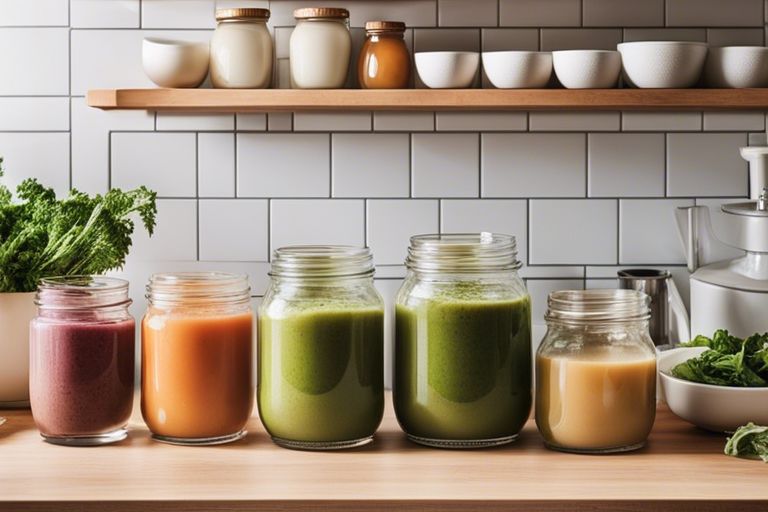tips, tricks and guides for parenthood
It's crucial for parents to be vigilant when preparing homemade baby food to ensure no harmful contaminants make their way into their little one's meals. From pesticide residues to bacterial growth, there are several dangers to watch out for. However, with proper handling, storage, and ingredient selection, it is possible to create nutritious and safe meals for your baby to enjoy. In this blog post, we will discuss important tips to help parents in avoiding these contaminants and provide guidance on how to safely prepare homemade baby food.

Any parent knows that the quality of ingredients used in homemade baby food is crucial for the health and well-being of their little one. When selecting ingredients, opt for organic produce to avoid harmful pesticides and chemicals. Additionally, choosing local produce not only supports local farmers but also ensures that the ingredients are fresh and full of nutrients.
With ingredients playing a vital role in your baby's diet, it's important to be aware of foods to steer clear of. Avoid honey and unpasteurised dairy products as they can pose a risk of botulism in infants. Likewise, steer clear of foods with added sugars, salt, and preservatives. Opt for single-ingredient, whole foods to provide the best nutrition for your baby's development.
Some of the most important steps in ensuring the safety of homemade baby food involve proper cleaning and sterilisation techniques. It is crucial to thoroughly wash all fruits and vegetables before use, as well as sterilise all utensils and equipment that will come into contact with the food.
Food preparation does not end with cleaning; cooking and storing food safely is equally vital. Ensure that all food is cooked thoroughly to kill any harmful bacteria. Store any leftover food in airtight containers in the fridge and consume within a few days to prevent contamination.
With these techniques, you can minimise the risk of harmful contaminants in your homemade baby food, protecting your little one's health and ensuring that they receive all the vital nutrients they need for healthy development.
Keep How to avoid heavy metals in your baby's food in mind while preparing homemade baby food. It's necessary to be aware of potential contaminants that can harm your little one.
To ensure your baby's food is safe, be on the lookout for common contaminants such as heavy metals, pesticides, and bacteria. These can be harmful to your baby's delicate system, so it's crucial to avoid them as much as possible.
Foods labelled as organic or certified are generally safer choices for your baby. When shopping for baby food, scan the labels for any added sugars, artificial ingredients, or preservatives. Choosing reputable brands that prioritise your baby's health and well-being is key.
After introducing single-ingredient purees to your baby, it's important to gradually progress towards more complex flavours and textures. Any baby's nutritional requirements evolve as they grow, so adjusting the meal plan accordingly is crucial. For example, iron-rich foods are important for brain development, so including sources like pureed meat or fortified cereals is beneficial.
Flavour is key when creating a balanced meal plan for your little one. Flavour introducing different tastes early helps develop your baby's palate and reduce picky eating tendencies later on. Variety Exposing them to a wide range of fruits, vegetables, grains, and proteins not only ensures they receive a broad spectrum of nutrients but also makes mealtime more enjoyable for them.
To conclude, ensuring that homemade baby food is free from contaminants is necessary for the health and well-being of your little one. By following proper hygiene practices, selecting fresh and organic ingredients, washing produce thoroughly, cooking foods to the right temperature, and storing food safely, you can minimise the risk of harmful substances in your baby's meals. Regularly cleaning utensils and food preparation areas can also help in preventing contamination. Always remember to introduce new foods one at a time and watch for any allergic reactions. Your efforts to provide your baby with nutritious and safe homemade food will contribute to their healthy growth and development. Here's to happy and healthy mealtimes with your little one!
A: It is crucial to avoid contaminants in homemade baby food to ensure the safety and well-being of your baby. Contaminants can cause serious health issues and affect the development of your little one.
A: You can prevent contaminants in homemade baby food by using fresh and organic ingredients, washing your hands and utensils thoroughly, storing food properly, and following safe food preparation practices.
A: Common contaminants found in homemade baby food include bacteria, pesticides, heavy metals, and packaging materials. These contaminants can be harmful to your baby's health if ingested.
A: To prevent contamination, store homemade baby food in airtight containers in the refrigerator for up to three days or in the freezer for up to three months. Always label and date the containers for proper rotation.
A: Yes, when making homemade baby food, avoid using honey, cow's milk, nuts, shellfish, and choking hazards such as whole grapes and popcorn. These foods can pose a risk to your baby's health and safety.